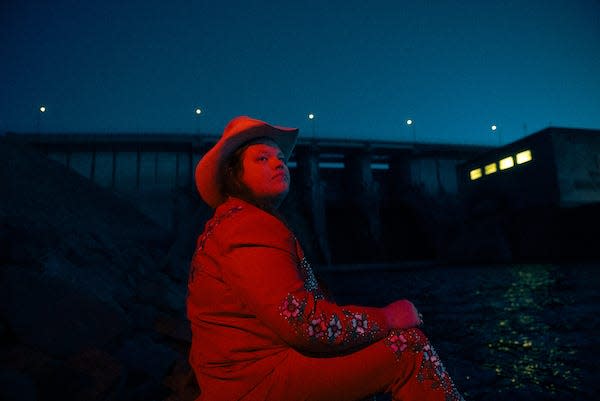Marcus King explores harrowing journey to sobriety via new album 'Mood Swings'
Note: This story contains details about suicide. If you or someone you know may be struggling with self-harm or suicidal thoughts, you can call the U.S. National Suicide Prevention Lifeline at 800-273-TALK (8255) any time day or night, or chat online. Crisis Text Line also provides free, 24/7, confidential support via text message to people in crisis when they dial 741741.
Early in his quick-rising Southern rock career, Marcus King's guitar playing could've easily been described as the heart of soul-baring authenticity in the genre. Impressively, via the work of producer Rick Rubin, King's voice—moreso than his virtuoso guitar skills—now arrives at the forefront via his album "Mood Swings," released on April 5, 2024.
For four decades, Rubin has achieved mastery at a style of production that removes superstardom's ability to psychologically impair an artist's ability to create with honest intent. This skill has catapulted greats in many genres, from stardom to superstardom or superstardom to iconography.

While in conversation with The Tennessean, King reflects on how Rubin's production style allowed his 11-track album to become a more introspective journey than he's ever taken as a recording artist.
He goes as far as to describe it as being stored in a metaphorical "deprivation tank."
As brutal as the process sounds, his art and life needed it.
How did King end up working with Rick Rubin?
King spent as much time in the last decade of his life staring at the bottom of bottles of various elixirs and feeling the physical and psychological effects of more than a few substances, while also studying rock guitarists and jazz theory, plus working with Dan Auerbach of The Black Keys and touring the world with acts like Chris Stapleton.
Initially, he didn't expect that working with Rubin would spur his newfound sobriety and clear-mindedness to advance his artistry.
Rubin was already a fan of country music, largely credited with the revival of Johnny Cash's career via what evolved into 25 years of "American Recordings" albums that encapsulated a decade before and after "The Man In Black"'s 2003 passing.

Thus, when King became aware that Rubin was a fan of a video recording of his 2020 Grand Ole Opry debut, the performer was initially stunned. Later, he'd be cutting material while at Rubin's Shangri La studio in Malibu.
King finally puts his mental health and sobriety first
Mental health and sobriety entered King's life at the making of "Mood Swings" because his hectic nature directly impacted public perception of his work.
Remaining sober and healthy is ever-present in King's life. To wit, "Mood Swings" opens with a vocal sample from Dr. Heinz Lehmann's "Faces of Depression" series of psychological interviews.
"And I think that is the part of hell that a person in depression really tastes. The hopelessness, the terrible hopelessness," it states.
'Standing naked in front of someone you don't like'
In relation, "Mood Swings"' track "Cadillac" describes in great detail how his life reached a point where he purchased a home with a garage in the belief that he'd sit in his car and die of asphyxiation.

"I was going to make an Irish exit in my American car," he says, still resolute about the pain in that era of his life.
He once romanticized dying in his home after what he describes as a lifestyle defined by "doing drugs, drinking, playing music and losing fistfights with (his) band."
"I only want people to hear that song if they know someone in a tough spot where they're thinking about either making a long Facebook post (in despair) or in the spot I wanted to put myself where I'd never feel anything, ever again," he says about a song that took him longer to write than any other work in his catalog.
Other song titles on the album include "F*** My Life Up Again," "Soul It Screams," "Save Me," "This Far Gone" and "Bipolar Love."
"I've been going to therapy since I was a kid and it wasn't until recently that I achieved the self-awareness and vulnerability necessary to see resolution," he said. "That feeling? It's uncomfortable, weird and like standing naked in front of someone you don't like."
An improved version of King's humanity and art
Concerning a song like "F*** My Life Up Again," the song's concept—the pain associated with having a codependent relationship with depression more than anything else—arrives before its melody. This allows a song to arrive that's "digestible" and defined by "direct, less metaphorical lyricism and comfortable songwriting tricks and tropes," he said.

King's falsetto and tenor joined his guitar skills and bandmates as an equal instrument at the project's forefront.
Thus, the album's initial foundation of guitar-heavy and Nashville-written folk songs evolved into a record that survived a "deprivation tank"—if only because the album's creative process included King's courtship and Feb. 2023 marriage to his wife, Briley.
"Cutting vocals with a lot of lust in my heart while trying to prove that I was worthy of marrying her was an inspiration, for sure," says King, laughing.
"I had a lot to sing because I finally was around someone that reflected the purity in my soul," says King about what he's tapping into. It's a project that sees his vocals approaching a style combining tinges of Donny Hathaway's schizophrenia-addled emotive rawness and D'Angelo's lovelorn battle between secular and spiritual inspirations.
Alongside the artists mentioned, King dives into songs like early 1970s Memphis R&B performer William Bell's "I Forgot To Be Your Lover" (sampled in 2001 by indie rappers Dilated Peoples for the single "Worst Comes To Worst") and Al Green's "How Can You Mend A Broken Heart" from the same era.
"Creating an album while prioritizing my mental and physical health allowed an album to be created that showcases an improved version of myself and my work," says King.
"I've treated my body like an outhouse for so long that you could say that I'm not happy right now, but I'm in remission from depression," he says. " I used to get tattoos to recover from hangovers. Now, I'm solely focused on playing good music for good people."
This article originally appeared on Nashville Tennessean: Marcus King: New album 'Mood Swings' focuses on sobriety, technique
